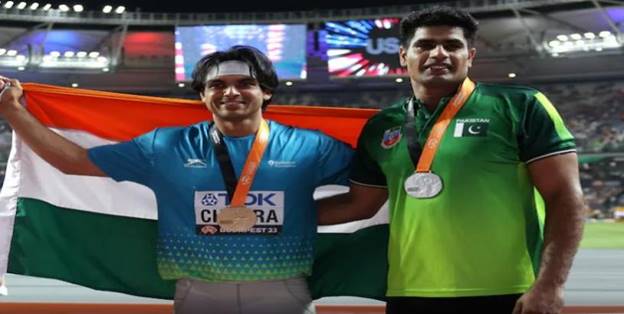
Neeraj Chopra and Arshad Nadeem. At a time when unvarnished animus for one another is often the norm in India and Pakistan, not to mention Bangladesh now, two simple women have offered a lesson in decency, dignity, and civility
After Olympian Rivalry, a Lesson in Civility from Indian and Pakistani Mothers
By Mayank Chhaya
Chicago, IL
What powered Arshad Nadeem and Neeraj Chopra’s spectacular javelin throws on the track in the Paris Olympics was the physics of thermodynamics and projectile trajectory. What also powered the two world-class athletes, from Pakistan and India respectively, was their mothers’ remarkably noble human values.
The art of javelin throw is all physics. From the time the thrower starts running, using kinetic energy until approaching the line before launching by breaking the momentum to a dead halt, even while turning sideways and acquiring an angle as close to 45 degrees as possible, it is all governed by laws of physics and aerodynamics.
Once the javelin is airborne, what distance it will cover depends on the amount of energy transferred from the athlete’s shoulders to the javelin and aerodynamics.
Nadeem’s mother Razia Parveen and Chopra’s mother Saroj Devi may or may not understand those complex factors, but they are both naturally ennobled in their worldviews. That prompted them to express themselves in a way that is being widely celebrated .
For Nadeem and Chopra what matters is how far their javelins travel.
In Nadeem’s case at the Stade de France, it was an astonishing 92.97 meters, more than 305 feet. In doing so, he beat defending champion Neeraj Chopra and flew past the Olympic record of 90.57 held by Norway’s Andreas Thorkildsen in Beijing 2008.
Arshad Nadeem’s feat gave his homeland much to cheer for – it was Pakistan’s first-ever track and field medal at the Olympics. It was also the country’s first Olympic medal since 1992, when the Pakistan men’s hockey team won bronze in Barcelona, Spain.
Cross-border sociocultural bonds
Not too far behind was Chopra who was also widely celebrated in his homeland.
He had won gold at the Tokyo Olympics by throwing his spear 87.58 meters, a little over 287 feet. At that event, Nadeem had managed 84.62 meters, about 277 feet, finishing in the fifth position.
Both may have had the 90-metre mark in their minds as they ran up, even though only Nadeem breached that twice.
Chopra and Nadeem were born the same year, 1997, in countries that have been irretrievably antagonistic for over seven decades now.
However, as it often happens among the peoples of India and Pakistan, institutional antagonisms do not always permeate sociocultural cross-border bonds which were gloriously symbolized by Razia Parveen and Saroj Devi.
It is quite extraordinary that both mothers have expressed similar sentiments after their respective sons’ victories.
“He (Neeraj) is like my son. He is also a friend and brother of Nadeem’s,” said Parveen after Nadeem’s Paris win. “Losing and winning is a matter of luck. May Allah also give him (Neeraj) success and ability to win a medal.”
On the other side of the border, Devi had said something similar about Nadeem when Chopra had won the gold at Tokyo.
Echoing Parveen’s sentiments now, Devi said: “We are very happy. For us, the silver (medal) is like gold and the one who won the gold (Nadeem) is also like my son. He works hard.”
Balmon inflamed emotions
The two mothers’ words, unadorned by sophisticated phraseology but articulated with deep humanity, reverberated across the India-Pakistan border.
At a time when unvarnished animus for one another is often the norm in India and Pakistan, not to mention Bangladesh now, the two simple women have offered a lesson in decency, dignity, and civility.
Their words have the potential to act as a balm over inflamed emotions promoted by the social media vulgarization of public discourse.
Whether the leadership of either country will feel inspired by the sporty bonhomie and friendship between the two athletes remains open to question.
Also open to question is whether the sheer humanity of these mothers will catalyze a change of heart that could lead to improved relations between neighbors whose association has been marred by years of political hostility.
(The writer is a Chicago-based journalist, author, filmmaker and lyricist. Email: mcsix@outlook.com . This is a Sapan News syndicated feature produced in collaboration with the South Asia Monitor .)

